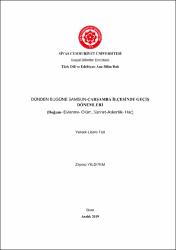| dc.contributor.advisor | Demren, Özlem | |
| dc.contributor.author | Yıldırım, Zeynep | |
| dc.date.accessioned | 2020-01-17T05:24:15Z | |
| dc.date.available | 2020-01-17T05:24:15Z | |
| dc.date.issued | 2019 | tr |
| dc.date.submitted | 2019-12-02 | |
| dc.identifier.other | IX, 411 sayfa | |
| dc.identifier.uri | https://hdl.handle.net/20.500.12418/12141 | |
| dc.description.abstract | Kültürel değerler bir toplumun korunmasında ve varlığını sürdürmesinde önemli bir yere sahiptir. Kültürünü kaybeden bir toplum asimile olmaya ve yok olmaya mahkûmdur. Kültürün gelecek nesillere aktarılması için gelişen ve dönüşen dünyada kayıt altına alınması gerekmektedir, alınmadığı takdirde değişip dönüşeceği ya da kaybolup gideceği kaçınılmazdır.
Kültürün canlı olarak yaşatılan öğelerinden olan geçiş dönemleri, Samsun’un Çarşamba ilçesi için tespit edilmeye çalışılmış ve bu çalışmayla ortaya konulmuştur. Bu çalışmada görüşme yöntemi kullanılarak alan çalışması yapılmıştır.
Çalışma “Doğum, Sünnet, Askerlik, Evlenme, Hac, Ölüm” olmak üzere altı bölümden oluşmaktadır. Kaynak kişi sayısı doğum bölümde 25, diğer beş bölümde ise 15 kişidir. Soru sayıları ise şu şekildedir: Doğum için 128, sünnet için 61, askerlik için 50, evlenme için 163, hac için 61, ölüm için 132’dir. Kaynak kişilerden alınan cevaplar olduğu gibi yazılmış aynı olan cevaplar bir kez yazılıp kaç kişi tarafından söylenildiği belirtilmiştir ve toplanan bilgiler ile genel değerlendirme yapılmaya çalışılmıştır. | tr |
| dc.description.abstract | Cultural values play an important role in the protection and survival of a society. A society that loses its culture is doomed to assimilate and perish. In order to transfer culture to future generations, it has to be recorded in the developing and transforming world. If it is not recorded, it is inevitable that it will change or become lost.
The transition periods that are most alive elements of the culture have been tried to be determined for Çarşamba district of Samsun and it has been put forward with this study. Fieldwork was done and interview method was used.
The study consists of six parts: Birth, Circumcision, Military, Marriage, Pilgrimage, Death.15 people were interviewed in each section; 25 people were included in the birth section. The number of questions are as follows: 128 for birth; 61 for Circumcision; 50 for Military; 163 for Marriage; 61 for Pilgrimage; 132 for Death. The answers received from the source persons were written as it is, the same answers were written once and indicated by how many people were told. After all, general evaluation was made with the collected information. | tr |
| dc.language.iso | tur | tr |
| dc.publisher | Sivas Cumhuriyet Üniversitesi - Sosyal Bilimler Enstitüsü | tr |
| dc.rights | info:eu-repo/semantics/openAccess | tr |
| dc.subject | Çarşamba | tr |
| dc.subject | Doğum | tr |
| dc.subject | Sünnet | tr |
| dc.subject | Askerlik | tr |
| dc.subject | Evlilik | tr |
| dc.subject | Hac | tr |
| dc.subject | Ölüm | tr |
| dc.title | Dünden Bugüne Samsun-Çarşamba İlçesinde Geçiş Dönemleri (Doğum- Evlenme- Ölüm, Sünnet-Askerlik- Hac) | tr |
| dc.type | masterThesis | tr |
| dc.contributor.department | Sosyal Bilimler Enstitüsü | tr |
| dc.relation.publicationcategory | Tez | tr |















